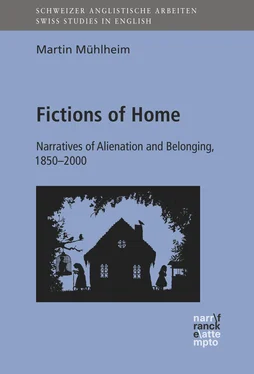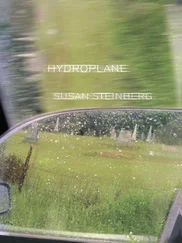However, before analyzing in more detail some vital components of Maggie’s struggle, we should perhaps rephrase the argument up to this point in terms of two different levels of critique: the mimetic or referential, and the literary or intertextualintertextuality. On the one hand, we have seen that The Mill on the Floss constitutes a far-reaching critique of VictorianVictorian gender normsgender norms and their adverse effects on women and, at least to some extent, on men as well. As this kind of critique is linked to the state of affairs in the real world, we may – for lack of a better term – call it mimetic or referential. Eliot’s novel highlights symbolically the extent to which Victorian gender normsnorms are sustained by central pillars of the bourgeoisbourgeois order: fathers (Mr. Tulliver), preachers and educators (Reverend Stelling), as well as lawyers (Wakem). Importantly, the novel does not depict these patriarchs as a monolithic and unified front of oppressionoppression; rather, the text depicts them as engaged in deep conflictconflict but nevertheless agreeing on one key issue: the inferiority of women as intellectually limited commodities that belong to the head of the family. The novel thus also portrays the family home as an institution that is deeply implicated in the reproductionreproduction of social injusticeinjustice, even as it acknowledges the deep bonds of affection between father and daughter, or sister and brother. Moreover, like so many a BildungsromanBildungsroman , it exposes important flaws in the educational system, and as such advocates social changechange.
Such referential critique is, however, complemented in the novel by what we might term literary or intertextualintertextuality critique. This includes, for instance, the way in which The Mill on the Floss challenges some key tenets of the BildungsromanBildungsroman as a genregenre by refusing to focus on Stephen Guest and instead juxtaposing three unsuccessful plots of formation: Maggie’s, Tom’s, and Philip’s, none of whom will find a true home in this world. In combining these three plots, the text highlights the limits to selfself-determinationself-determination, and thus qualifies an overly optimistic conception of human agencyagency inherent to classical ideals of BildungBildung . Moreover, the novel questions the political innocenceinnocence of ironyirony as a stylistic device, and to some extent at least rejects what it portrays as a classclass-based stance. The strongest expression of this incomplete but significant repudiation is the narrator’s increasing rejection of ironicirony distance from Maggie, which has led critics to accuse Eliot’s novel as a whole of unseemly immaturity. Similar accusations could be leveled against the narrator’s nostalgicnostalgia tone, if one were to analyze nostalgianostalgia as merely a regressiveregression yearning for an idealizedidealization childhoodchildhood home. However, the novel cautions us against such a simplistic assessment of the nostalgicnostalgia impulse, and instead pits it against a narrative of implacable progressprogress in order to highlight the latter’s emotional as well as social costs. If this last point threatens to collapse the distinction between referential and intertextualintertextuality critique, then this is not a coincidence, but instead one of the novel’s key arguments: that social critique ought not limit itself to what we might call the world’s content, but must also pay attention to its style and its discursive arrangements of oppressionoppression. To put things somewhat differently: one’s lossloss of home may derive from material deprivation or from one’s lack of a proper place in the symbolic order – and, not infrequently, from a combination of the two.
Maggie’s Dreams: Awakening and Romance
It is with these considerations in mind that we must now analyze Maggie’s struggle, as an emotional conflictconflict that arises from her desiredesire to honor past duties and, at the same time, to strive towards future fulfillment; she wishes to develop as a ‘free’ individual without relinquishing the ancestral home that stands in the way of that very development. Maggie’s passionate response – as a young woman who has lost the material security of home (and the social status associated with it) – to the writings of the late-medieval mysticmysticism Thomas à Kempisà Kempis, Thomas needs to be seen in this context. In à Kempisà Kempis, Thomas’s asceticasceticism philosophyphilosophy, Maggie believes to have found a way of resolving the dilemma between individual desire and social limitationslimitations:
[H]ere was a sublimesublime height to be reached without the help of outward things; here was insight, and strength, and conquest, to be won by means entirely within her own soul […]. It flashed through her like the suddenly apprehended solution of a problem, that all the miseries of her young life had come from fixing her heart on her own pleasurepleasure […]; and for the first time she saw the possibility of shifting the position from which she looked at the gratification of her own desires – of taking her stand out of herself, and looking at her own life as an insignificant part of a divinely guided whole. (237; bk. 4, ch. 3)
Maggie finds herself doubly deprived: as a woman refused the benefits of educationeducation, and as a daughter sufferingsuffering from the family’s very material downfall. This explains why the notion of “means entirely within her soul” must seem so appealing, as it involves neither intellectual nor material resourcesresources; it is a matter of the soul, not of the mind or the bodybody. Maggie, in other words, hopes to solve these conflicts by discursively reframing her needs as merely “the gratification of her own desires,” and as insignificant in the larger scheme of things. It is precisely the emphasis of want that leads Maggie to embrace an emphatic beliefbelief, in the hopehope that this will help her recover the “sense of home” that she has been unable to find in the “world outside the books” (194; bk. 3, ch. 5).
Significantly, it is Philip who ends Maggie’s mysticmysticism dream of cheerful resignation by challenging its underlying assumptions about the nature of longing and desiredesire. Ascetics like Thomas à Kempisà Kempis, Thomas assume that desire binds us to a fallen world to which we do not truly belong, and that therefore desire itself is the main obstacle to our quest for a lasting, transcendent home. Philip, however, questions Maggie’s beliefbelief that denying her longings is the path to true belonging:
It seems to me we can never give up longing and wishing while we are thoroughly alive. There are certain things we feel to be beautiful and good, and we must hunger after them. How can we ever be satisfied without them until our feelings are deadened? I delight in fine pictures; I long to be able to paint such. I strive and strive, and can’t produce what I want. That is pain to me, and always will be pain, until my faculties lose their keenness […]. (246; bk. 5, ch. 1; original emphasis)
Longing may mean sufferingsuffering, Philip admits, but it is also essential to a fulfilling and truly human life. The German philosopher Ludwig FeuerbachFeuerbach, Ludwig, who claims that God is nothing but an outward projectionprojection of humankind’s own essential nature, and whose Das Wesen des Christenthums ( The Essence of Christianity ) Eliot herself had translated into English in 1854, makes a case very similar to Philip’s:
I feel feeling […] as belonging to my essential being, and, though the source of all sufferings and sorrows, as a glorious, divine power and perfection. What would man be without feeling? It is the musicalmusic power in man. ( The Essence of Christianity 63; ch. 5)118
Читать дальше












